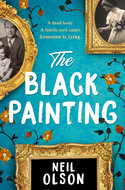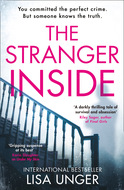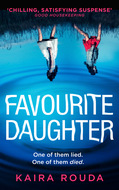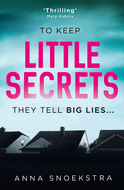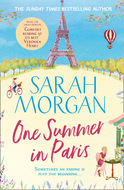Kitap dosya olarak indirilemez ancak uygulamamız üzerinden veya online olarak web sitemizden okunabilir.
Kitabı oku: «Under My Skin», sayfa 2
PART ONE
Hypnagogia
Between the dreams of night and day there is not so great a difference.
—Carl Jung, Psychology of the Unconscious
1
“I think someone’s following me.”
I almost kept this to myself, but toward the end of our session it just tumbles out.
Dr. Nash wrinkles her brow with concern. “Oh?”
Her office is a cozy living room, all big furniture and fluffy throw pillows. There are shelves and shelves of books and pictures, and trinkets, small art objects from her travels. It’s exactly the kind of office you’d want your shrink to have. Warm, enveloping. I sink deeper into my usual corner on her plush couch, leaning heavily on the overstuffed armrest. I resist the urge to curl up in a ball and cover myself with the cashmere blanket that’s tossed artfully over the back. A grouping of those faux candles flicker on the coffee table; she made me some tea when I arrived. It sits in front of me, untouched.
“The other night when I left the gym, there was someone standing across the street. I think I saw him again this morning on a park bench near my office.”
Even thinking about it, there’s a flutter of unease.
The doctor shifts in her leather Eames chair; it’s too well made to creak beneath her weight. She’s a wisp of a woman. The leather just whispers against the fabric of her pants. Afternoon light washes in, touching her hair and the side of her face. There are these longish pauses in our conversation where she chooses her words, letting mine ring back to me. She takes one now, considering me.
“Are you certain it was the same man?” she asks finally.
A cool October breeze wafts in the open window, street noise carrying up from nine floors below. A horn, the rumble of a manhole cover wobbling beneath the weight of passing vehicles, the yipping of some small dog. I imagine a Yorkie in a little sweater, straining against a slender leash.
“No,” I admit.
“But certain enough that you’re uneasy about it.”
I’m already sorry I brought it up. I did see someone, a man in a black hoodie, sneakers, faded jeans. He stood in a dark doorway across the street when I left the gym last Tuesday. Then on Thursday as I headed to my office clutching my daily quadruple espresso, I saw him again. I felt his eyes on me, the details of his face hidden in the dark shadow of that hood.
I dismissed it. There are lots of staring men clad in jeans and hoodies in this city. Any girl will tell you, there are always eyes on you, unsolicited comments, unwanted noises, unwelcome approaches. But then maybe I saw him once more over the weekend, when I was coming home from the farmers’ market. Still, it’s hard to be certain.
“Well,” I backpedal. “Maybe it wasn’t the same man.”
I shouldn’t have said anything. I don’t want her to think I’m backsliding. Stumbling toward another breakdown. When something like that happens to you, there’s this energy to the people who care about you, like they’re always waiting for signs that it’s going to happen again. I get it; they don’t want to miss the tells a second time and run the risk of losing you again, maybe for good. Even I’m wary. I feel a little sick about that black spot in my memory where I took a vacation from reality, how fuzzy are the days surrounding Jack’s murder.
So. I try not to think about it. It’s one of the things from which I am trying to move on. That’s what you’re supposed to do, you know, when the worst thing happens and you’re still standing. Everyone’s very clear about it: you’re supposed to move on.
“It’s probably nothing,” I say, stealing a surreptitious glance at my watch. My smartphone, my tether as Jack liked to call it, is off and tucked into my bag, as per Dr. Nash’s office rules. Here we free ourselves of distractions and try to be present in a world that conspires against it, she has said more than once.
Dr. Nash watches me, prettily brushing away an errant strand of her lovely gray-blond bob. Behind her there’s a picture of her family—her chiseled-jaw, graying husband, her grown children both with her same delicate features, intelligent eyes. They all stand together on a terrace overlooking a beach sunset, smiling, faces pressed together. We’re perfect, it seems to say. Wealthy and gorgeous, without a single stain of darkness on our lives. I look away.
“I noticed you’re not wearing your rings,” she says.
I look down at my left hand. The finger is slightly indented from my wedding and engagement rings, but bare.
“When did you make that decision?”
My hands swelled the other night, and I took the rings off and put them in the dish beside my bed. I haven’t put them back on. I tell her as much. Jack has been dead almost a year. I’m not married anymore. Time to stop wearing the jewelry, right? Even though the sight of my bare hand puts a painful squeeze on my heart, it’s time.
“Was it before or after that you started seeing the hooded figure?”
Dr. Nash is the master of the pointed question.
“I see where you’re going with this.”
“I’m just asking.”
I smile a little. “You’re never just asking, Dr. Nash.”
We like each other. Sometimes, lately, our sessions devolve into chats—which she says is a sign I need her less. A good thing, according to her. Progress on the road to healing, the new normal as she likes to call it.
“How are you sleeping?” she asks, letting her other question rest.
I have the nearly empty pill bottle in my purse. Last time I asked for more, she wrote me a scrip but lowered the dosage. I’d like you to try to get off these. Honestly, it hasn’t been going well. My dreams are too vivid. I’m less rested, so edgier, jumpier during the day.
“I was going to ask for my refill.”
“How’s that lower dosage?”
I shrug, trying for nonchalance. I don’t want to appear fragile, not to her, not to anyone. Even though I am, terribly. “I’m dreaming more. Maybe I feel a little less rested.”
“You’re not taking more of them, though, are you?”
I am. I’m also doing other things I shouldn’t be doing. Like taking them with alcohol, for one.
“No,” I lie.
She nods carefully, watching me in her shrink way. “You’ve been taking them for eleven months. I’d like to go down to the minimum dosage with an eye toward your being off them altogether. Want to give it a try?”
I hesitate. That chemical slumber is the best place in my life right now. I don’t say that, though. It sounds too grim. Instead I find myself agreeing.
“Great,” she says. “If it’s an issue, we’ll go back up to the dosage you’re on now. And those dreams? Go back to the dream journal you were keeping when Jack first died. It’s an important part of our lives, our dream world. As we’ve discussed, we can learn a lot about ourselves there. Do you still keep it by your bed?”
“Yes.”
She hands me the white slip of paper.
“Well,” she says. I stare at the crisp sheet, her doctor’s scrawl. “I think our time is up for today.”
I’m always a little startled by the end of a session, the abrupt reminder that no matter how intimate, how I strip myself bare in these sessions, ours is a professional relationship. If I stopped paying, these chats with Dr. Nash would come to an unceremonious end.
“And, Poppy? If you see him again, call me.”
A siren from the street below drifts up, a distant and ghostly wail. This sound, so frequent in the cacophony of city noise, always makes me think of Jack. About an hour after he left that morning, emergency vehicles howled up the avenue beneath our window. There should have been some premonition, some dark dawning, but there wasn’t.
A lingering head cold had kept me in bed instead of going with him as I normally would have.
You could have died that morning, too, Layla says when we go over and over it.
Or maybe it wouldn’t have happened at all. Maybe we would have run in a different direction. Or maybe we could have fought off the attacker together.
Or maybe, or maybe, or maybe—on and on. Infinite possibilities, myriad ways Jack might still be with me. He overslept; a light caused him to cross another street; I was there and twisted my ankle, causing us to return home. I turn to those scenarios in blank moments, in dreams, when I should be paying attention in meetings. So many other paths he could have taken and didn’t.
“I’m not imagining him.” It seems to come out of nowhere.
Dr. Nash cocks her head at me. “I didn’t say you were.”
I bend down and grab my bag, come to standing as she does.
“And lock your doors. Be mindful,” she adds.
“You sound like my mother.”
She chuckles. “We can talk about that next session.”
“Very funny.”
* * *
I walk toward the subway, needing to get back downtown for a two o’clock meeting. I’m probably going to be late—again. The city is such a mess, a constant crush of traffic and delayed trains. I think about a cab or an Uber, but sometimes that’s even worse, snaking through jammed streets, trapped in a box, trying to decide if it would be faster to just get out and walk. The whole city seems to conspire against promptness.
I text my assistant, Ben. Running late, I tap in quickly and descend beneath the street. It’s Monday midday, so it’s not as crowded as it could be. Though the day is mild, the platform is hot as an oven and smells like piss. My stress level starts to tick up.
Jack wanted us to leave Manhattan; he’d grown to hate it. Everything that was cool about it is gone. It’s just an island for the rich. He dreamed of a historic property upstate, something with a lot of land, trees, trails to wander. Something we could renovate and make ours. He longed to disconnect from the rush of wanting, grasping, striving, at least on the weekends. He wanted time back behind the camera. He didn’t get any of those things.
We were packing when he died, boxing up the one-bedroom Upper West Side apartment we’d shared for five years. But instead of moving out of the city, we were moving to The Tate, a luxury high-rise in Chelsea—a gleaming tower of apartments with floor-to-ceiling windows, offering stunning vistas, high ceilings, wood floors, chic open-plan kitchens, pool and gym, a 24/7 building staff. It was me. I was the one who wanted it; he acquiesced.
He loved our dark, cozy place on Ninety-Seventh—with views of the other building across the street, with radiators that clanked, and mice in our ridiculously dated kitchen, and the old doorman Richie, who’d worked there forever and was sometimes asleep when we walked in. He loved our crazy, colorful cast of neighbors—Merlinda, the psychic who read clients in her apartment; Chuck—or Chica—accountant by day, drag queen by night, who had the most beautiful singing voice I’d ever heard; Bruce, Linda and Chloe, public school teachers and their adorable, gifted daughter, our next-door neighbors who never failed to invite us for Sunday dinner.
Now I live in a starkly beautiful space that looks out onto lower Manhattan—alone. I don’t even know who lives in the apartment next to me. The hallways are gray tunnels, lined with doors that seem to rarely open. In my apartment, the furniture is placed appropriately—bed in the bedroom, couch in the living area—but most of the boxes are still unpacked. To say I miss my husband, our wacky neighbors, that dark old apartment, our life—well, why? There are no words to adequately describe that slick-walled gully of despair. Suffice it to say that I can’t seem to fully move into my new life without Jack.
I’m sorry, I tell him. I wish I had listened to you.
Dr. Nash says it’s okay to talk to him, if I understand he’s not talking back.
Time drags and I’m ever more fidgety, annoyed. More people file down the stairs. The platform grows dense with bodies, the air thickening with impatience. Still the train doesn’t come. I lean over the edge of the platform to see if I can spot the glow of an oncoming headlamp. No.
I glance at the clock. There is officially no way to be on time now. A bead of perspiration trails down my spine. A glance at my phone reveals that there’s no signal.
When the train finally screeches into the station, it’s already packed. I wait by the door, letting the flow of people exit. There’s no guarantee that the next train will be any less crowded, and that waiting meeting looms. I shoulder myself on, shimmying toward the door that connects one car to the other; find a space with a little breathing room. The cars fill.
Stand clear of the closing doors.
The doors close, open again, then finally shut for good. The train lurches forward, stops, jostling everyone, then onward again. I close my eyes, try to breathe. The crowded space is closing in already. I am not great in tight spaces, which is an uncomfortable condition for a city dweller. It’s worse since Jack died; the fingers of panic tugging at me more than they used to. I lean my head against the scratched, foggy glass. Breathe. Just breathe. Imagine you’re on a trail in the woods, plenty of space, the tall green trees giving oxygen and shade. There’s a bird singing, the sound of the wind in the leaves. It’s the meditation Dr. Nash gave me for dealing with anxiety in crowds or anywhere. Occasionally, it works.
But when I open my eyes again, he’s there. That hooded man, pressed in among the crowd in the other car, a statue amidst the clutter of shuffling, jostling passengers. His eyes are hidden by the shadow of the hood, but I can feel them. Is it the same man? My heart stutters, a suck of fear at the base of my throat.
Reality cracks, a fissure splits in my awareness. For a moment, quick and sharp, I’m back in my own bedroom. The space beside me on the king mattress is cold when it should be warm. The covers are tossed. Jack left for his run without me, letting me sleep.
“Jack?”
Then I’m back, the train still rattling, rumbling. I’m stunned, a little breathless; what was that? A kind of vivid remembering, a daydream? Okay. It’s not the first time it has happened; but it is the most vivid. The woman next to me gives me a sideways glance, shifts away.
Pull it together, Poppy. The stranger—he’s still there. Is he watching me?
Or is he just another blank commuter, lost in thought about home or work or whatever it is we ponder when we’re zoning out, traveling between the places in our lives. Maybe he’s not seeing me at all. For a moment, I just stare.
Then, unthinking, I push through the doors, stepping out onto the shaking metal platforms between the cars. This is a major subway no-no, I think as I balance and grope my way through the squeal of metal racing past concrete, metal on metal singing, sparking, then through the other door into the relative quiet of the next car.
He moves away, shoving his way through the throng. I follow.
“What the fuck?”
“Watch it.”
“Come on.”
Annoyed passengers shoot dirty looks, shift reluctantly out of my way as I push after him, the black of his hood cutting like a fin through the sea of others.
As we pull into the next station, he disappears through the door at the far end of the car. Trying to follow him, I find myself caught in the flow of people exiting, and get pushed out of the train onto the platform. I finally break free from the crowd, jog up the platform searching for the hooded figure among tall and short, young and old, backpacks, briefcases, suits, light jackets, baseball caps. Where is he?
I want to see his face, need to see it, even though I can’t say why. Distantly, I’m aware that this is not wise behavior. Not street-smart.
Don’t chase trouble, my mother always says. It will find you soon enough.
Then the doors close and I’m too late to get back on. Shit. My phone chimes, finding a rare spot of service underground.
A text from Ben: ETA? They’re going to wait a bit, then reschedule. Assume you’re stuck on the train.
It isn’t until the train pulls away that I see the stranger again, on board, standing in the door window. He’s still watching, or so it seems, his face obscured in the darkness of the hood. I walk, keeping pace with the slow-moving train for a minute, lift my phone and quickly take a couple of pictures. I can almost see his face. Then he’s gone.
2
I arrive at the office frazzled, sweaty, full of nerves, late for the meeting. In the bathroom, running my wrists under cold water, pulling shaking fingers through my dark hair, I stare at my reflection in the mirror.
Pull. Yourself. Together.
My face is sickly gray under the ugly fluorescents, as I dab some makeup on the eternal dark circles under my eyes, refresh lipstick and blush. A little better, but the girl in the mirror is still a tired, wrung-out version of the person she used to be.
Rustling through my bag, I find the bottle of pills Layla gave me. It’s blank, the little amber vial, no label. For nerves, she said. I hesitate only a second before popping one in my mouth and swallowing it with water from the faucet, then try to take some centering breaths. Dr. Nash is not aware of my unauthorized pill-taking, one of multiple things I keep from her. I know. What’s the point of keeping things from the person who is supposed to be helping you?
As I walk past Ben’s desk, he rises and hands me a stack of messages.
“They’re waiting,” he says, dropping into step beside me. “You’re fine.”
“Great.” My smile feels as stiff and fake as it is. “The subway is a mess.”
“Everything okay?”
He inspects me through thick, dark-rimmed glasses, tugs at his hipster beard. He’s a stellar assistant; I keep trying to promote him but he doesn’t want to go. My clients love him—he’s on top of all their contracts, tracks down their payments, helps with grant and residency applications. Over the past year, he’s been more agent to them than I have. He could probably just take over and I could slip away. It’s tempting, that idea of slipping away, disappearing—another life, another self.
“Yeah,” I say unconvincingly. Ben watches after me with a frown as I push into the conference room.
“His work,” Maura is saying. “It’s stunning.”
“Whose work?” I ask, taking my seat at the head of the conference table. “Sorry I’m late.”
All eyes turn to me. When Jack was alive, I could come and go unnoticed. He ran the meetings and I was the number two—critical to the running of the office, but not the magnetic, energetic head of the meeting table. He brought a light and enthusiasm for the craft, for the business into every gathering. I am not the captain he was, I know, but I’m doing my best. They watch me now—respectful, kind, hopeful.
Jack picked out everything in this room, from the long sleek conference table to the white leather swivel chairs, the enormous flat screen on the wall. His photo from an Inca Trail trek, featured in Travel + Leisure, is blown up onto an enormous canvas. He took it from his campsite above the cloud line—orange tents blossom in white mist, as clouds fall away into a landscape of jade and royal blue, the dip of the valley dark and the sky bright.
“Alvaro’s,” Maura says. “He took that Nat Geo job to photograph the okapi living in the Ituri Rainforest, just got back yesterday.”
The photos come up on the screen—lush, jewel greens and deep black, a red mud road twists and disappears into a thick of forest; a girl, her eyes dark and staring, stands on a riverbank in a grass skirt, her expression innocently teasing. A blue-and-white truck travels precariously over a swaying wooden slat bridge.
Maura runs a manicured hand over her black hair, pulled tight into a ponytail at the base of her neck. She’s young, but her almond-shaped eyes reveal an old soul. Olive-skinned, almost birdlike in her delicacy, she’s a firebrand agent, fiercely protective of her clients. She worries over them like a mother hen.
“The colors, the movement, the energy,” I say. “They’re wonderful.”
The trunk of a tree, hollowed out and haunted, twisting, branches reaching up into deep green black. The shots of the okapi, an animal that is partially striped like a zebra, but related more closely to a giraffe, are stunning—a mother nursing her young, a young male hiding in tall grass, a small herd underneath a wide full moon.
“They are,” Maura agrees. Her smile is wide and proud. “He’s—amazing.”
I wonder, not for the first time, if something is going on between Maura and Alvaro. It’s not a good idea for an agent to fall in love with a photographer she represents. In fact, it’s not a good idea for anyone to fall in love with a photographer. The unfiltered world never quite measures up to whatever he sees through that lens. Alvaro Solare, Jack’s best friend and the firm’s first client, is the typical roving photographer, always in pursuit of the next perfect shot. Which means the rest of the world can go to hell. There are a string of heartbroken women in his wake. I’d prefer Maura not become one of them. But it’s not really my business.
The rest of my agents run down the status of their clients’ assignments. Our firm, Lang and Lang, mine and Jack’s, represents photographers. We are a boutique agency, small but successful, with some of the top names in fashion, feature and news photography on our roster.
What started as a small enterprise in our apartment, has grown into an agency with a suite of offices in the Flatiron Building. Jack, affable and mellow, was a natural mediator. When Alvaro was in a dispute with the New York Times travel section, Jack stepped in and resolved it over drinks with the photo editor, an old friend of his. Alvaro paid Jack 15 percent out of appreciation. One thing led to another, and after a year Jack was turning down photo assignments, and representing more of his friends, including me.
So, after years of hustling as travel photographers, scraping together a living, we traded in our life of adventure for a firm dedicated to protecting the rights of people who make a living with a camera in their hands. Alvaro thought it was a mistake, that we were wasting our talent and our lives. And he never lost an opportunity to tell us so. But we thought it was time to settle down, start a family. Except it didn’t work out that way.
I half listen as the other agents run down problems and successes. I comment, make suggestions, offer to make a call to a contact of mine at Departures. But mostly, I am still on that train, chasing after the man in the hood.
I wonder if anyone notices that I am a ghost in my life.
* * *
It’s another half hour before I am back in my office, scrolling through the blurry, useless photos I took on my smartphone. The light was poor, too much motion. That dark form is just a smudge, a black space between the grainy commuters all around him. I use my thumb and forefinger to enlarge the image on the screen, but it looks ever more amorphous as a low-quality image will.
I start to doubt myself, my grip on reality. What did I see really, after all? Just a man with a hood, who might or might not have been looking in my direction.
I don’t even notice Ben until he’s sitting across the desk from me. There’s a look I don’t like on his face, worry, something else.
“What?”
He leans back and crosses his legs. “When were you going to tell me?”
“Tell you?”
“That you’re dating again.”
I shake my head, not wanting to get into it. “I’m not.”
“So, who’s Rick, then?” He slides a message across my desk. There’s another one from him in the stack I’ve just barely started to sort through. I’m old-school; I still like paper messages to toss when calls are returned, write notes on, keep as reminders.
“He’s no one,” I say.
I wouldn’t say I’m exactly dating. There’s a snow globe on my desk, a little farmhouse surrounded by trees. Jack gave it to me one Christmas. This is what our house will look like, out in the country. Quiet. Away from all the chatter. I tip it and watch the snow swirl around the black branches.
“I saw your profile online,” says Ben. He peers over his glasses, a gesture he thinks makes him look wise, worldly. It really doesn’t. He’s far too young to be either of those things.
Putting the snow globe down, I lean back in my chair and frown at him.
“What are you doing on an online dating site, a young hottie like you? They must drop like flies.”
He shoots me a faux-smarmy eyebrow raise. “That’s what we do. The millennials? It’s how we roll. Tinder, OKCupid, Match.com. Love is just a swipe away.” He makes a wave motion with his hand.
“So, it’s not just for old people, then?” I sift through the tiny white sheets of paper. “The divorced, the forever single—the widowed.”
Widowed. I hate that word; it evokes black veils and wails of grief. It defines me by the loss of my husband, as though I’m less now that he’s gone. Of course—I am. I regret saying it as soon as it’s out of my mouth. The word hangs in the air between us. When I look up from my messages, Ben has me pinned in a thoughtful gaze. Another youngster with an old soul; it seems we have a type in our small firm.
“If you must know, it wasn’t my idea.”
“Let me guess.” He shifts forward, puts his elbows on his knees.
“Layla came over. Wine was consumed. The next thing I know, I’m back in the dating scene.”
I don’t think you can clinically call what I’m doing dating. In the olden days, we used to refer to it as sleeping around. A relationship? A boyfriend? No. I don’t want those things. Not yet. Maybe not ever. But, wow, does it ever feel good to be touched again. I don’t share this with Ben, who is studiously massaging that hipster beard he’s so proud of. I wish he’d cut it off. It’s borderline offensive, though I can’t say why precisely.
“It’s a good thing,” he says finally, rising. “And Rick sounds like kind of a nice guy. He’s hot, too. Looks like he could have money.”
“You checked him out?” I say, mock mortified.
“Uh,” he says, widening his eyes. “Yeah.”
I smile at my young friend, my assistant who has outgrown his position but still likes it. If he has a girlfriend, or a boyfriend—or whatever—he never says so. I open my email; an impossible number of messages await.
“Two calls in a day,” says Ben, moving toward the door. “I like his confidence. A man who knows what he wants.”
“Confidence or arrogance?” I ask. “Desperation?”
“Let’s call it—” Beard rubbing, word searching. “Assertiveness.”
“Send him an email, will you? Tell him drinks on Thursday?” I ask.
“From you or from me?”
“Would it be weird if it was from you?”
“Seriously weird,” he says, then rethinks. “Well—more like pretentious. Have your people call my people? Do you want to be that person?”
“Fine—from me.”
Ben frequently sends emails at my direction from my account. Never anything big, just setting meeting times, quick one-line answers to various questions.
“Where?”
I shrug. “I don’t care. He can choose.”
Ben hesitates in the door a minute, his lanky form in my peripheral vision. Then he leaves me and I am alone with that image staring back at me from my smartphone. I close the photo app and put the device down, shut my eyes and draw in a few deep breaths. That’s the other thing you’re supposed to do when you’re trying to move on, to smooth out the edges of the panic, sadness, anger or whatever overtakes you—focus on the breath. Breathe, they tell you.
Whatever that pill was, it has smoothed out the edges some, for sure. I’m lighter, less shaky.
But—honestly—I’m scared; fear tickles at the back of my throat. There’s a white noise of anxiety in the back of my head. It’s not just the man in the shadows, on the train. He is scary, sure. If there really is someone following me, then yes, it’s weird and frightening. What’s scarier, though, given my history, is if there isn’t.
* * *
I finish out the day, and work late, pushing everything else away. There are contracts to review, emails to answer, a dispute between a fashion photographer and a model she supposedly came on to, then ejected from a shoot when he refused her, another dispute between a feature photographer who’d submitted photos to a travel magazine, filed for payment via their Kafkaesque system, and ninety days later still hadn’t been paid. Work is easy, a cocoon that keeps the chaos of life away.
When I look up from my desk again it’s after seven and all the other offices are dark. The refrigerator in our break room hums, a familiar and weirdly comforting sound. Half of the hallway lights are off, leaving the space dim and shadowy. I know Ben was the last to leave and he locked me in on the way out, reminding me to set the alarm when I finally took off for the night.
As I’m packing my bag, a phone starts ringing in one of the offices. It bounces to the main line, and I reach over to pick it up. There’s no number on the caller ID, but I see that it came from Maura’s extension. Maybe it’s Alvaro; he used to call late for Jack. We’ve drifted since Jack’s death, not that he and I were ever really friends. In fact, despite his extraordinary talent, and his close friendship to Jack, I’ve always considered him a giant asshole. I really hope, for Maura’s sake, that she hasn’t fallen for him.
“Lang and Lang.”
There’s just a crackling on the line.
“Hello?” A strange sense of urgency pulls me forward in my seat.
There’s a voice but so much interference that I can barely make it out. I hang on awhile longer, listening. A strain of music. The blast of a horn. That voice, it’s throaty and deep, talking quickly, unintelligible through the static. Is it familiar?
Poppy. I think he says my name. Something about it sets my nerve endings tingling.
“Yes, this is Poppy. Sorry—I can’t hear you.”


